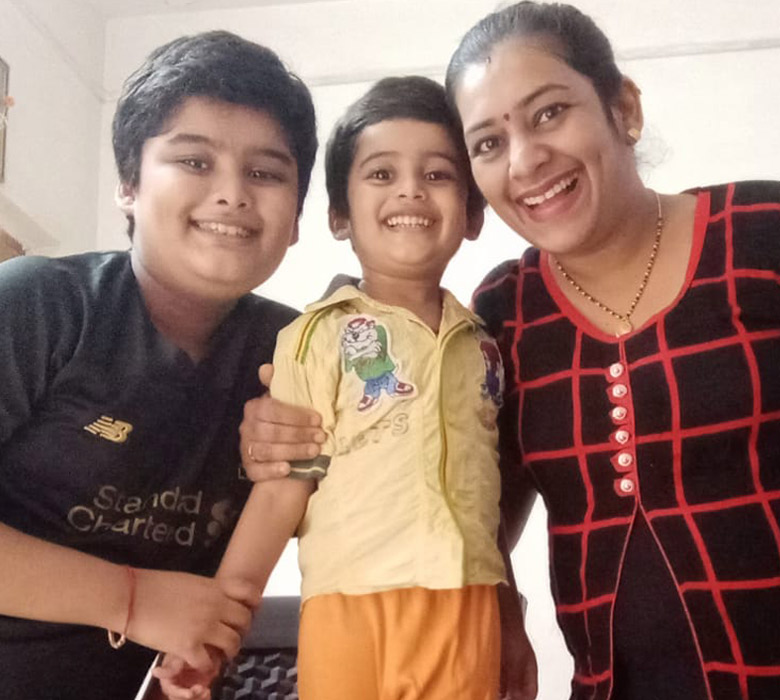Resilience Redesigned: The MarketPlace Way - 7
November 23, 2020
Life was never exactly easy in the narrow lanes of the Santacruz, Mumbai slum. The coronavirus and lockdown restrictions have made everything even more complicated. Yet there are still inspiring stories from the staff at SHARE, MarketPlace Bombay, and MarketPlace Chicago. These are all accounts that have moved the staff whether it was another colleague or the artisans and their children. Refusing to be discouraged, they are finding ways to not only cope, but triumph.
CARING FOR THE COMMUNITY
By Pratibha - Program Coordinator, Darpan and Social Action
When the lockdown period was extended the government announced special food subsidies for some people who have ration cards. This affected some of the artisans and their families, so the social workers made sure to get the word out by way of conference calls. The program leaders in the cooperatives have been very active in helping the women in their groups. In addition, they have made sure the information has gotten out to the larger communities, an important part of our social action mission.
Two leaders who merit special mention are Sangeeta Jadhav and Vaishali Adkar. Sangeeta is a tailor and now a cutter who has been part of the Arpan cooperative for 25 years. Vaishali has been an embroidery artisan associated with Ware for 4 years. With their combined efforts, 16 community families in Santacruz and Thane were able to get the subsidized ration benefit. In fact, Vaishali took it a step further. Since she had been getting the benefits from the beginning, she shared some of her rationed food with families who were in need as they waited for their benefits to start. These are characteristics of good leaders and we are fortunate to be working with such motivated and inspirational women.

KEEPING IN TOUCH; MAKING TECHNOLOGY WORK
By Rajashree - Assistant Social Worker
When the lockdown started, all the usual projects and systems came to a sudden halt. We social workers quickly realized that we needed to figure out how to reach out to the children and women when we were all under a stay at home order. To discuss the situation, we had a conference call. That was the first time I had ever participated in a conference call, but it was the first of many.
In the beginning the calls occurred every other day between staff as we formulated plans. As the projects started we began conference calls with the artisans and their families. All of the groups were divided among team members so that no artisans were left out. We regularly discussed what we had heard from the artisans with other staff members so that we were all well informed.
It was a memorable occasion when I initiated my first conference call. I had been participating in many, but this was the first time coordinating one on my own. I informed the artisan individually of the day and time for the joint call but when I tried connecting all of them I could not merge the calls. After two failed tries I got my son to help me and I was so happy to be able to connect the call! It was the first conference call for those artisans and they were very surprised and happy to be able to speak to one another after not seeing each other for a long time. One member, Nilma, kept giggling because she could not believe she was using technology. She had a smartphone but had only used it for simple calls. Now we not only do conference calls but also Google Meet and Zoom calls with the artisans and everyone has become very comfortable with the new media.

STRENGTH AND UNITY
By Rajashree - Assistant Social Worker
The lockdown period presented the cooperatives' leaders with unprecedented difficulties. They had to try to manage production with all the restrictions on travel and with social distancing. Even after the groups were able to start coming to the workshops there were complications. Some of the women were reluctant to go out to work, even if it was a short walk to the center. In many cases their families were also afraid that they would be exposed to COVID-19. With time most of the women felt safe enough to return to work.
I worked closely with the groups in Nallasopara and discussed the situation with Sampada, the leader of SMM Cooperative. She told me about one of the embroidery artisans, Purnima, who was not coming to pick up her assignments. Sampada's concern was twofold: SMM needed to get orders done before the deadline (they take pride in their on-time performance); and she knew Purmina really needed to earn as her husband was not employed. When I called Purnima to understand her reasons for not coming, she told me that she has two young children and she was afraid of contracting and spreading the virus.
As a solution we arranged for Nilima, an artisan who lives near Sampada, to pick up and drop off the pieces for Sampada to embroider. This is not the usual practice, but Purnima, Sampada and Nilima worked together for a solution. The group showed strength and unity in a difficult time. And, as the situation improved, Purnima felt safe enough to come to the workshop again.

CLICK ON THE LINKS BELOW FOR MORE STORIES.
Resilience Redesigned: The Marketplace Way-1
Resilience Redesigned: The Marketplace Way-2
Resilience Redesigned: The Marketplace Way-3
Resilience Redesigned: The Marketplace Way-4
Resilience Redesigned: The Marketplace Way-5
Resilience Redesigned: The Marketplace Way-6
